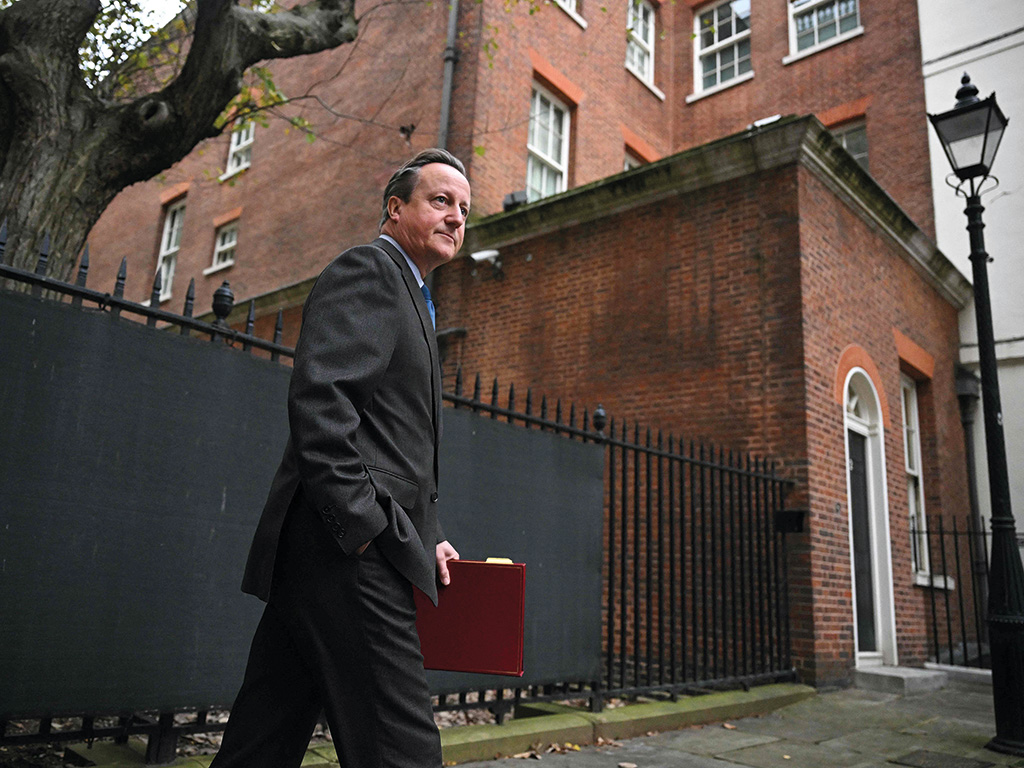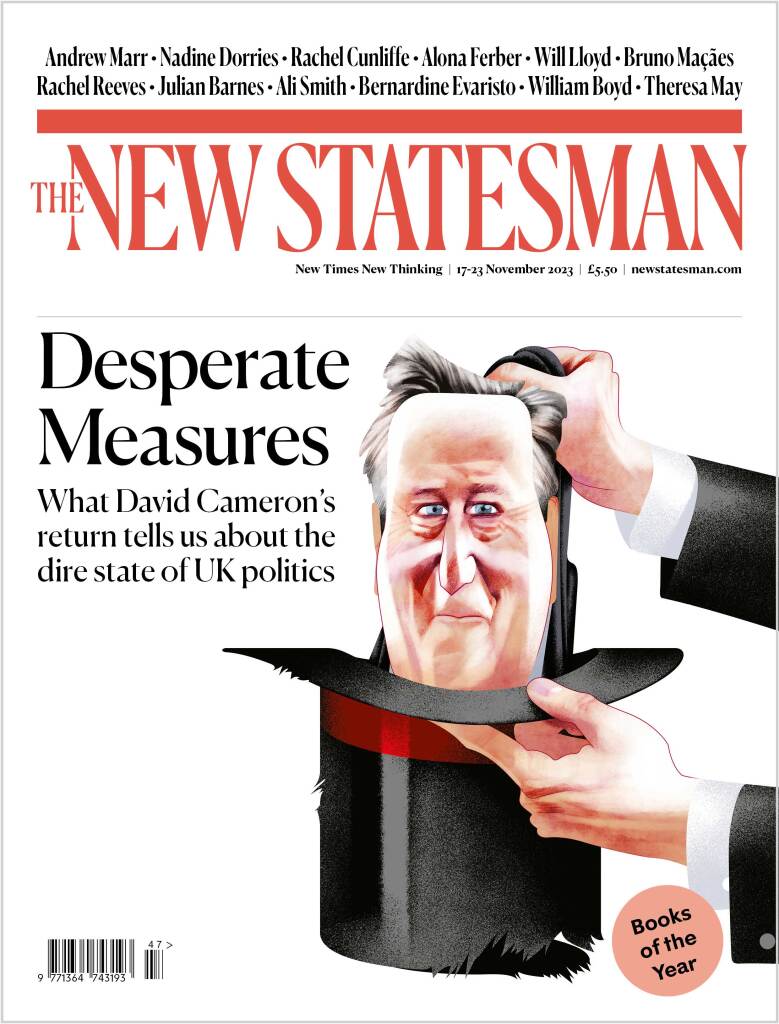
It was not the message, I suspect, that Rishi Sunak meant to send with his theatrical reshuffle centred on the sacking of Suella Braverman as home secretary and the surprise return of David Cameron to the Foreign Office. But the events of the week of 13 November confirm the end of Conservative England as a dominant political force.
In trying to strengthen his personal authority, Sunak has ignited yet another civil war. Braverman’s letter to him in response to her sacking turned out to be an incendiary declaration of revolt, which accused the Prime Minister of being a liar who had betrayed the British people, and her, over private promises on migration, the boats and gender issues: “Either your distinctive style of government means you are incapable of doing so. Or, as I must surely conclude now, you never had any intention of keeping your promises.”
[See also: Keir Starmer is emerging as a national leader]
As if by prior arrangement, the “New Conservative” group of Tory MPs had only minutes earlier accused Sunak of walking away from Red Wall voters.
And indeed, in shaping a nostalgically old-Tory cabinet and sacking Braverman, the Prime Minister has chosen sides. He has accepted that it is no longer possible to hold together a coalition of populist, Brexity, anti-immigration poorer voters in company with relatively affluent and more liberal “mainstream” Conservatives.
Sunak will never publicly admit it. But he is right to make the choice and he has chosen the bigger, if quieter, side. The prospect of losing the trust of habitual Conservative voters in the better-off shires and provincial towns – moderate, anxious, biddable and, yes, perhaps, slightly wet Britain – was, Sunak judged, more dangerous than losing the new Conservative voters in the English north and Midlands persuaded by Boris Johnson in 2019.
Now, surrounded by Jeremy Hunt, David Cameron, Victoria Atkins, James Cleverly, Laura Trott and Oliver Dowden, Sunak has assembled a team as reassuring as possible for people horrified by the coarsely aggressive rhetoric of Braverman, the sloppy ill discipline of Johnson’s Downing Street and the market meltdown of the Liz Truss experiment. Despite announcing himself at the conference in Manchester only last month as the “change” candidate, turning the page on the “failed consensus” of recent decades, he has Photo-shopped a Consensus Family portrait, with himself grinning at its centre.
This is going to make for some weird cabinet meetings. Sunak will have, sitting alongside him, in Lord Cameron, a man with far more experience than him who entirely disagrees with the Brexit project and with whom he has fallen out publicly over HS2. The dynamic around the table will be interesting and perhaps, as the children say, awks.
Notwithstanding Sunak’s own role as an early Brexiteer, the right will ask whether this is any longer a Brexit party at all – and the right will have a point. The Vote Leavers who occupied Downing Street after the last election saw Brexit not as an ending to be swiftly tidied up, but as the beginning of a project that gave power and agency to discontented, dispossessed voters across the Midlands and the north, which slashed regulations and taxes, and turned borders from bridges into drawbridges.

Regardless of which way the Supreme Court ruled on the Rwanda scheme, that project was always going to flounder. “Singapore-on-Thames” was burned to the ground by Truss and Kwasi Kwarteng. I don’t believe the voters of Britain ever bought in to such a free-market revolution, but Truss and Kwarteng’s impatience, their contempt for financial institutions and their political inexperience finished it off.
Elsewhere, there is almost nothing left of levelling up. Other radical Johnson-era projects, such as social care reform, have been ditched. Any dash for growth has been replaced by a slow, patient orthodoxy.
Sunak will try small gestures to reassure the right, the most enjoyably ludicrous of which so far has been the appointment of Esther McVey as “common sense czar” promoting the government’s “anti-woke agenda”. But none of this will placate anyone. Andrea Jenkyns’s furious letter to the chairman of the 1922 Committee, Graham Brady, began “Enough is enough”, before a tirade describing her leader as an unelected, failing Machiavellian plotter with no testicles – an epistle so angry that it left English grammar twisting in the wind. More tersely, the Johnson supporter, wealthy internal organiser and former party co-treasurer Peter Cruddas summed up the reshuffle: “The coup is complete. Remain has won and democracy has lost.”
There will be more letters from MPs, more public warnings and much more angry private plotting. But though the right has the MPs and megaphones to further hammer an utterly battered Tory brand, they don’t have the numbers to achieve anything positive.
[See also: Rishi Sunak’s Suella Braverman nightmare isn’t over]
On the other side, Cameron’s appointment gives Sunak a much better-recognised and respected face in foreign affairs. It’s easy to criticise Cameron’s record as prime minister over Libya, Syria and Afghanistan. Which modern British leader, pray, in this age of decline can point to a good record? Brexit was another thing entirely. But, again, had Cameron held out against a referendum he would have been removed as Conservative leader, and he knew it.
The public remembers him for austerity, which may explain snap polling hostile to his return. And the “unelected Prime Minister appointing an unelected Foreign Secretary” will have traction outside Westminster. Our democratic self-confidence is wavering. Many younger voters in particular cannot understand how it is possible to appoint someone who is not an MP to a great office of state. Explain the peerage dodge, and confusion shifts to outrage.
What can the Tory right do? Defect to Reform UK? Bold, but there may be some of that. Rally behind Braverman as a leader in exile? Futile, right now: if they dare to put the party through yet another leadership challenge in a further twist in the pantomime that is Westminster Tory politics, the country will demand an immediate general election.
The likeliest strategy is a grumpy, rivalrous regrouping after an election defeat. This reshuffle, intended to strengthen the Prime Minister’s authority, has only created a clearer picture of the deep division in his party: deep enough to end the notion of an all-conquering, all-embracing Conservative movement – the end of Conservative England, and thus Tory Britain, as a coherent political force.
So, quite a moment. There comes a point when a party is so lacking in self-belief, so short of remaining elected talent, and so clearly without a central idea that even its own MPs are stumbling around asking for the humane killer.
It is completely understandable, on a human level, that Sunak should want to keep going for as long as he can. Being prime minister is fun, the kind of high that no other job offers. The houses, money and status are the least of it. It’s more being ushered from one meeting to another to take crucial decisions, again and again and again. Sunak, as his recent “interview” with Elon Musk demonstrated, is looking ahead. But for now, he wants to keep going: sacking Braverman showed that he wants to go down – if that is what is going to happen – in a way that ensures he will be remembered for his values, not anyone else’s.
The trouble is, his party wants out. With Braverman, Sunak tried to internalise the rebel right and failed; with Cameron, he is trying to internalise Remain, too many years later. We desperately need an election, but the worst news from the reshuffle is that Britain is likely to be put through another year of this. Would Cameron have given up his lucrative private work for a job lasting a few months? Wouldn’t he have got a private pledge from Sunak?
And so, on and on it goes. Sweet Lord. In terms of national morale, investment and business confidence, how will we cope?
[Listen now: Is Britain really great? With Armando Iannucci]
This article appears in the 15 Nov 2023 issue of the New Statesman, Desperate Measures






